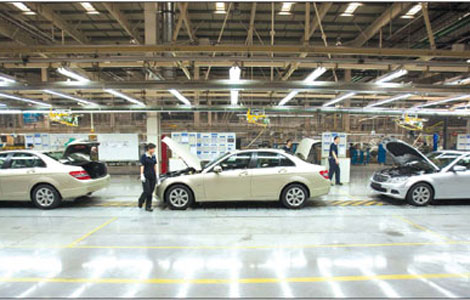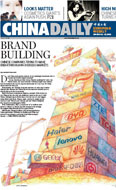Web Comments
Obama's state of the union address and American reality
Updated: 2011-02-09 13:53
By Han Dongping (chinadaily.com.cn)
Like most of his predecessors, President Obama -- with an educational background in political science at Columbia University and Harvard Law School -- is an eloquent public speaker. His command of the English language and his perfect delivery easily put him among the ranks of the top orators in today's world.
President Obama started his State of the Union address by describing the American people as one family, all sharing one common idea and one American dream. The reality is very different from the picture presented in President Obama's description. In the aftermath of the shooting in Arizona, members of Congress decided to sit together, with Republicans and Democrats intermingling in the hall of the legislature for the first time. This symbolic gesture cannot hide the economic and political divisions present within American society.
However, just recently, President Obama agreed to extend Bush's tax cuts for the very wealthiest in America (less than one percent of the total population), amid the ever-growing government deficit. With this compromise bill, the richest people in the US would be able to transfer up to five million dollars of their assets to their children, tax-free. In return for this compromise on the Democrats' part, the Republicans agreed to extend unemployment benefits to the desperate working-class Americans who have already used up their standard unemployment benefit.
In the face of the rising national debt and government deficit, the most sensible thing for any good government to do, would be to increase tax revenue by taxing the very wealthiest -- who can best afford it -- helping the unemployed who are desperately in need of government services. President Obama can't do this, however. In order to be reelected in 2012, he can't afford to alienate the very rich and powerful members of American society. He has already learned this lesson from his setback in the midterm election.
In his State of the Union address, President Obama acknowledged the fact that China is growing rapidly. He described the current situation as the “Sputnik moment” of the current generation. He promised to improve US competitiveness by investing more money in education; however, the primary problem in America is not education. As Obama himself stated in the same address, the US has the best universities and colleges in the world, attracting more international students than any other country in the world.
The American problem is providing adequate job opportunities for the US's highly educated population, and retaining the talents that come to the United States from other countries. If the young, well-educated American people can't find adequate employment, then these young people will become more discontent. In turn, the international students who come to the US to gain education will return to their homelands when they are unable to find jobs in the US. Ultimately, US will merely be cultivating talent for other countries. The crucial challenge that currently faces the US is job creation.
President Obama stated that the US will be competing with China and India, as well as with other countries, for jobs. In today's globalized world, capital -- which always seeks to maximize profit -- will move to places where the cost of manufacturing is the lowest. It is very unlikely that President Obama will have the courage and ability to change the patterns of flow of American capital, let alone world capital. As multinational corporations continue to relocate to the countries, such as India and China, where the cost of production is relatively low, unemployment will remain a problem for the US and for other countries in the industrialized world where labor costs are relatively high.
In the US, as long as a person has a job, he and his family will generally fare well. The worker will be able to enjoy a middle-class lifestyle. Once the worker loses his job, however, he will lose everything -- the house, the car, the overall way of life -- without relief from the government. Unemployment is a serious problem in China, as well. However, over half of the Chinese population remains connected to their rural roots. They still have houses in the countryside and small plots of land on which to grow their own food. If they lose their jobs in the urban areas, they can always return to their rural hometowns to maintain a subsistence lifestyle. These rural and urban connections will be very important for China for the future.
Overall, I support the ideas presented by President Obama in his State of the Union address. That being said, I will wait and see how Obama and his administration will manage to solve the challenges facing the country, without taking tough measures such as cutting the military budget and increasing taxes on the very rich. I will also wait to see whether the administration will be able to start providing seed money for young college graduates, in order for them to start small and productive businesses to support themselves. This will be a true test of American democracy. Will the “government of the people” be able to find effective solutions for its people? We shall see, very soon.
Han Dongping is Professor of History and Political Science at Warren Wilson College, NC.
E-paper

Factory fever
Despite auto manufacturing bubble scare, car giants gear up expansion of factories.
Dressed for success
Fabric of change
High spirits
Specials

Earthquake Hits Japan
A massive 8.8 magnitude quake hit the northeast coast of Japan on March 11,2011.

NPC & CPPCC sessions
Lawmakers and political advisers gather in Beijing to discuss major issues.

Slide: Japan quake
Devastating earthquake and tsunami left millions without water, electricity, homes or heat.
